外研版(2019) 必修三 Unit 5 What an adventure Using language课件(共25页PPT)
文档属性
| 名称 | 外研版(2019) 必修三 Unit 5 What an adventure Using language课件(共25页PPT) | 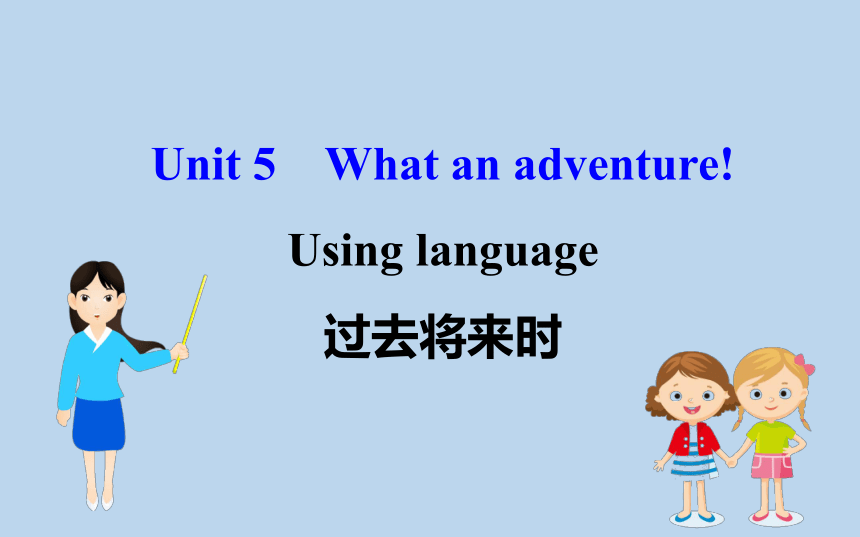 | |
| 格式 | ppt | ||
| 文件大小 | 2.0MB | ||
| 资源类型 | 教案 | ||
| 版本资源 | 外研版(2019) | ||
| 科目 | 英语 | ||
| 更新时间 | 2020-08-10 18:32:00 | ||
图片预览

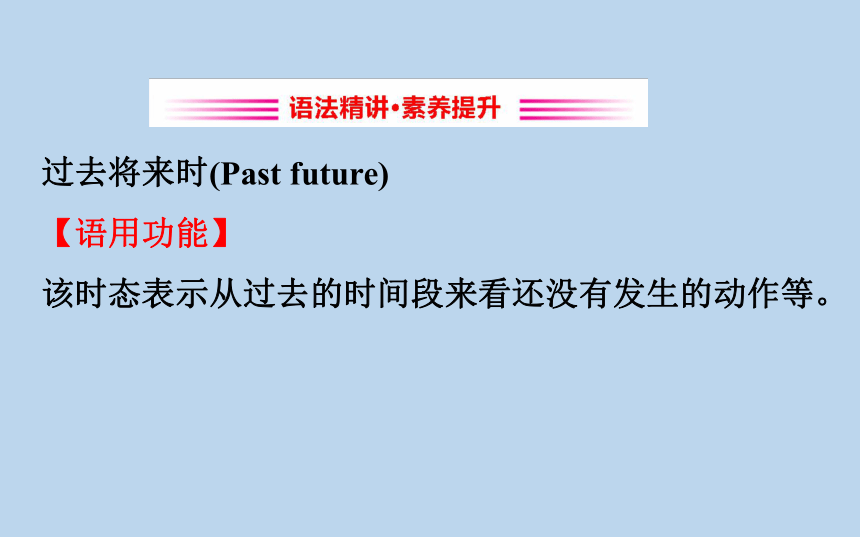

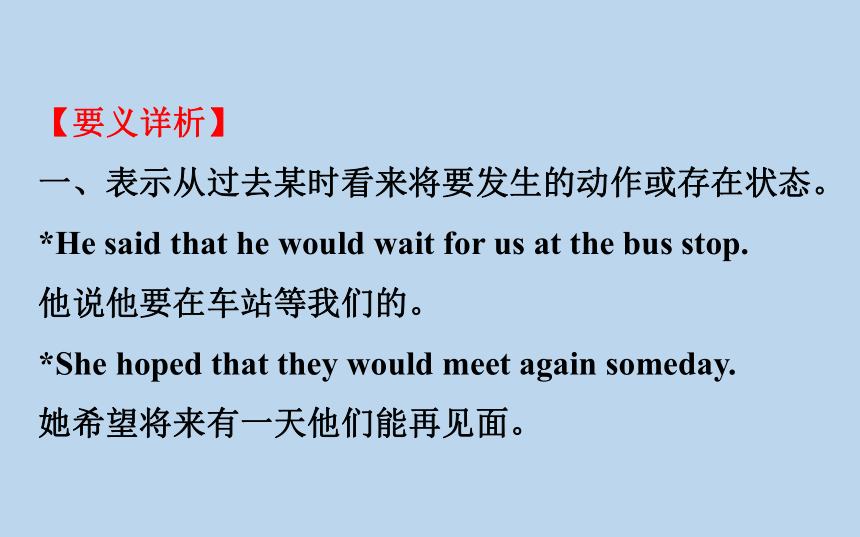
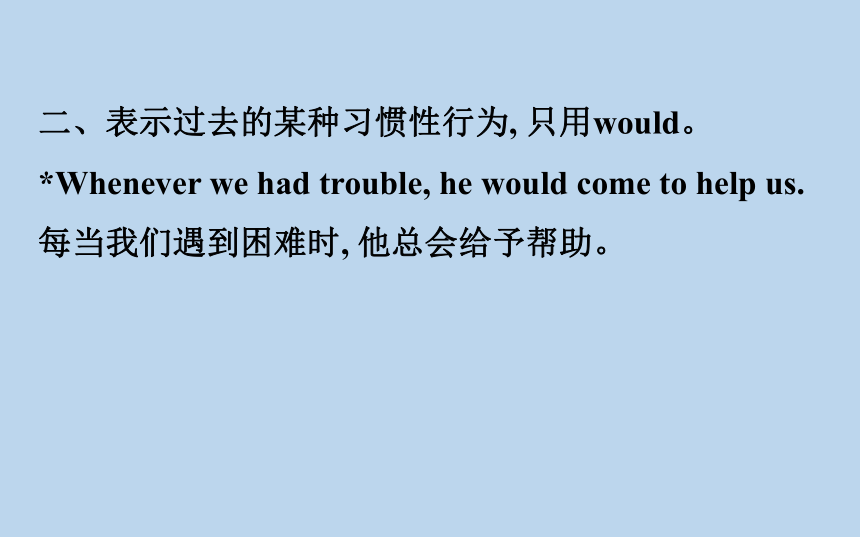
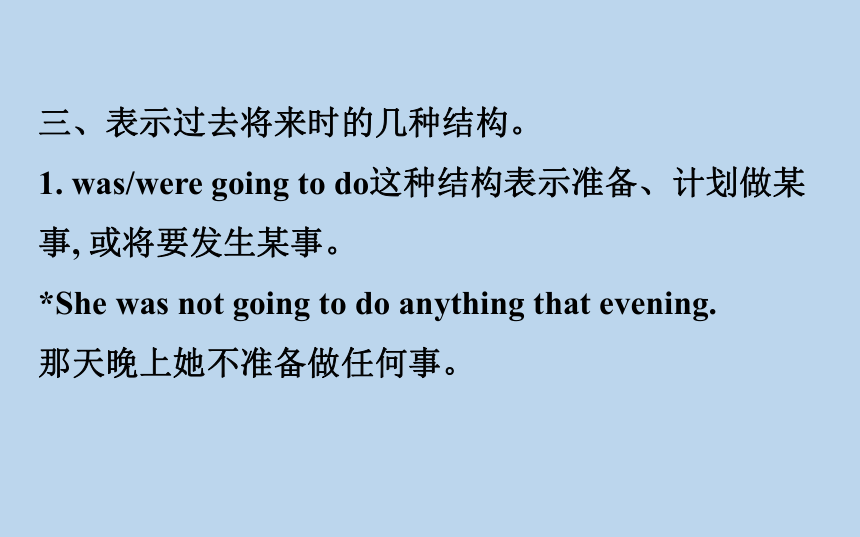
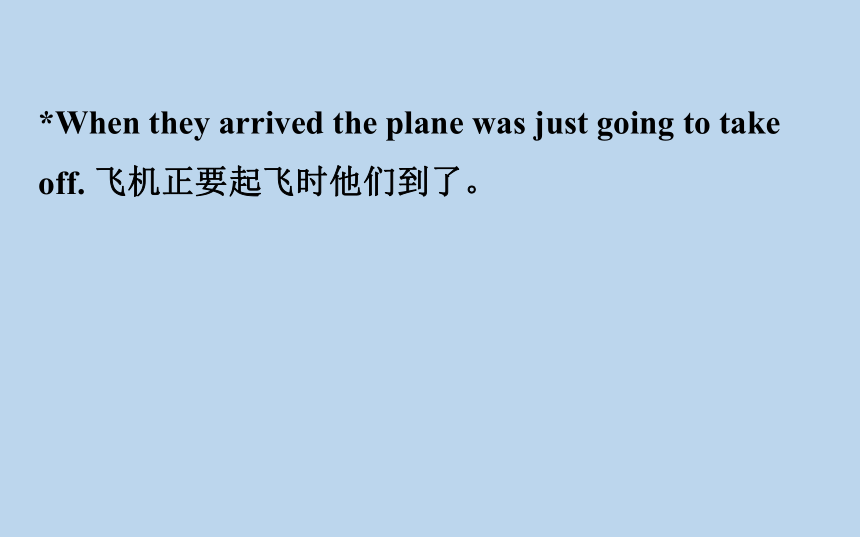
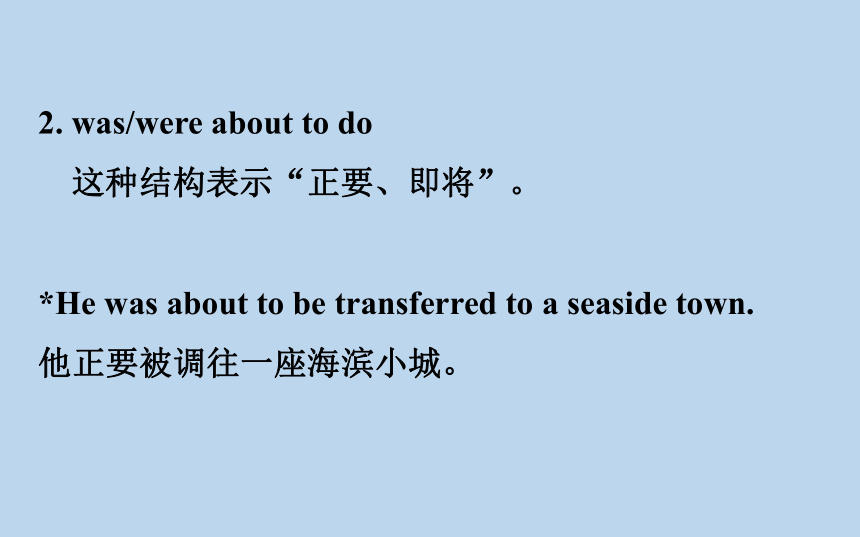
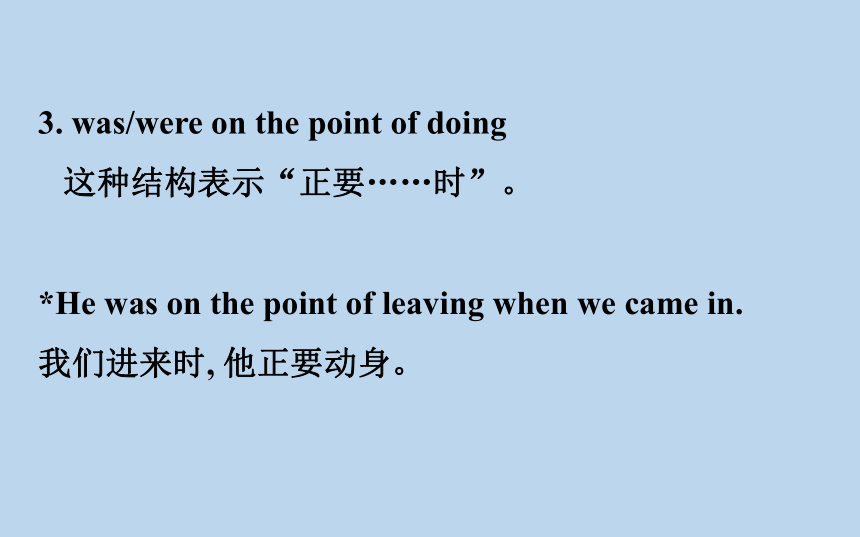
文档简介
Unit 5 What an adventure!
Using language
过去将来时
过去将来时(Past future)
【语用功能】
该时态表示从过去的时间段来看还没有发生的动作等。
【情境探究】
观察上面对话, 黑体部分时态为___________。
过去将来时
【要义详析】
一、表示从过去某时看来将要发生的动作或存在状态。
*He said that he would wait for us at the bus stop.
他说他要在车站等我们的。
*She hoped that they would meet again someday.
她希望将来有一天他们能再见面。
二、表示过去的某种习惯性行为, 只用would。
*Whenever we had trouble, he would come to help us. 每当我们遇到困难时, 他总会给予帮助。
三、表示过去将来时的几种结构。
1. was/were going to do这种结构表示准备、计划做某事, 或将要发生某事。
*She was not going to do anything that evening.
那天晚上她不准备做任何事。
*When they arrived the plane was just going to take off. 飞机正要起飞时他们到了。
2. was/were about to do
这种结构表示“正要、即将”。
*He was about to be transferred to a seaside town.
他正要被调往一座海滨小城。
3. was/were on the point of doing
这种结构表示“正要……时”。
*He was on the point of leaving when we came in.
我们进来时, 他正要动身。
4. was/were due to do
这种结构表示“定于(某时做某事)”。
*The ship was due to leave at mid-night.
船定于午夜起航。
*The talk was due to last for three days.
谈话将要进行三天。
5. go, come, leave, take off等少数动词可用过去进行时表示过去将要发生的情况。
*A lot of people were coming to watch the fireworks.
有许多人要来观看焰火。
*She told mother that she was going to a dance with Tom.
她告诉母亲, 她要和汤姆一起去参加一个舞会。
【易错精点】
这些动作表示短暂意义, 延续性动词不能用于该结构。
6. was/were to do
表示曾计划做某事, 如果计划的事情没有实现, 要用不定式的完成式。
*She said she was to have taken up the position, but later changed her mind. 她说她本打算承担这个职务的, 但是后来改变了主意。
7. 过去将来时还可以用来表示非真实的动作或状态。
*If I had a chance to study abroad, I would study at Harvard University.
如果我有机会出国学习的话, 我就会去哈佛大学。
【即学活用】
1. I didn’t know when he ______ ___ __ the park.
我不知道他什么时候去公园。
2. He said that he ______ ____for me at the school
gate.
他说他会在学校门口等我。
would
go
to
would
wait
3. She told me she ____ _____ __ ___ __ Yunnan.
她告诉我她要飞往云南。
4. I ____ _____ __ _____ the house when the telephone
rang.
电话铃响时, 我正要离开房子。
5. She said she ____ __ ____ ___ the position.
她说她要承担这个职务。
was
going
to
fly
to
was
about
to
leave
was
to
take
up
Activity 1
Compare the two groups of sentences and answer the questions.
a Last year, hundreds of people spent good money on an experience that they knew would include crowds, discomfort and danger.
b … Alan Arnette, who climbed Qomolangma in that year and was going to climb other high mountains around the world.
Activity 1
Compare the two groups of sentences and answer the questions.
c This year, hundreds of people spent good money on an experience that they know will include crowds, discomfort and danger.
d … Alan Arnette, who has climbed Qomolangma and is going to climb other high mountains around the world.
Activity 1
Compare the two groups of sentences and answer the questions.
1. What is the differrence between the two groups of sentences?
2. What clues in the sentences help you decide which tense to use ?
3. Match each group of sentences to the correct timeline.
Activity 2
Activity 2
a the storm which would last for three full days
b where we would remain for many months to come
c we wouldn’t be back for a very long time
d we were sailing from port
1–d 2–c 3–a 4–b
Activity 3
Activity 3
I was going to hunt for food, but my knee was wounded.
I was going to collect some water, but I found there was a hole in the side of the bucket.
I was going to put up the tent, but I found I hadn’t got a hammer and nails.
I was going to build a fire, but suddenly it started to rain.
Using language
过去将来时
过去将来时(Past future)
【语用功能】
该时态表示从过去的时间段来看还没有发生的动作等。
【情境探究】
观察上面对话, 黑体部分时态为___________。
过去将来时
【要义详析】
一、表示从过去某时看来将要发生的动作或存在状态。
*He said that he would wait for us at the bus stop.
他说他要在车站等我们的。
*She hoped that they would meet again someday.
她希望将来有一天他们能再见面。
二、表示过去的某种习惯性行为, 只用would。
*Whenever we had trouble, he would come to help us. 每当我们遇到困难时, 他总会给予帮助。
三、表示过去将来时的几种结构。
1. was/were going to do这种结构表示准备、计划做某事, 或将要发生某事。
*She was not going to do anything that evening.
那天晚上她不准备做任何事。
*When they arrived the plane was just going to take off. 飞机正要起飞时他们到了。
2. was/were about to do
这种结构表示“正要、即将”。
*He was about to be transferred to a seaside town.
他正要被调往一座海滨小城。
3. was/were on the point of doing
这种结构表示“正要……时”。
*He was on the point of leaving when we came in.
我们进来时, 他正要动身。
4. was/were due to do
这种结构表示“定于(某时做某事)”。
*The ship was due to leave at mid-night.
船定于午夜起航。
*The talk was due to last for three days.
谈话将要进行三天。
5. go, come, leave, take off等少数动词可用过去进行时表示过去将要发生的情况。
*A lot of people were coming to watch the fireworks.
有许多人要来观看焰火。
*She told mother that she was going to a dance with Tom.
她告诉母亲, 她要和汤姆一起去参加一个舞会。
【易错精点】
这些动作表示短暂意义, 延续性动词不能用于该结构。
6. was/were to do
表示曾计划做某事, 如果计划的事情没有实现, 要用不定式的完成式。
*She said she was to have taken up the position, but later changed her mind. 她说她本打算承担这个职务的, 但是后来改变了主意。
7. 过去将来时还可以用来表示非真实的动作或状态。
*If I had a chance to study abroad, I would study at Harvard University.
如果我有机会出国学习的话, 我就会去哈佛大学。
【即学活用】
1. I didn’t know when he ______ ___ __ the park.
我不知道他什么时候去公园。
2. He said that he ______ ____for me at the school
gate.
他说他会在学校门口等我。
would
go
to
would
wait
3. She told me she ____ _____ __ ___ __ Yunnan.
她告诉我她要飞往云南。
4. I ____ _____ __ _____ the house when the telephone
rang.
电话铃响时, 我正要离开房子。
5. She said she ____ __ ____ ___ the position.
她说她要承担这个职务。
was
going
to
fly
to
was
about
to
leave
was
to
take
up
Activity 1
Compare the two groups of sentences and answer the questions.
a Last year, hundreds of people spent good money on an experience that they knew would include crowds, discomfort and danger.
b … Alan Arnette, who climbed Qomolangma in that year and was going to climb other high mountains around the world.
Activity 1
Compare the two groups of sentences and answer the questions.
c This year, hundreds of people spent good money on an experience that they know will include crowds, discomfort and danger.
d … Alan Arnette, who has climbed Qomolangma and is going to climb other high mountains around the world.
Activity 1
Compare the two groups of sentences and answer the questions.
1. What is the differrence between the two groups of sentences?
2. What clues in the sentences help you decide which tense to use ?
3. Match each group of sentences to the correct timeline.
Activity 2
Activity 2
a the storm which would last for three full days
b where we would remain for many months to come
c we wouldn’t be back for a very long time
d we were sailing from port
1–d 2–c 3–a 4–b
Activity 3
Activity 3
I was going to hunt for food, but my knee was wounded.
I was going to collect some water, but I found there was a hole in the side of the bucket.
I was going to put up the tent, but I found I hadn’t got a hammer and nails.
I was going to build a fire, but suddenly it started to rain.
